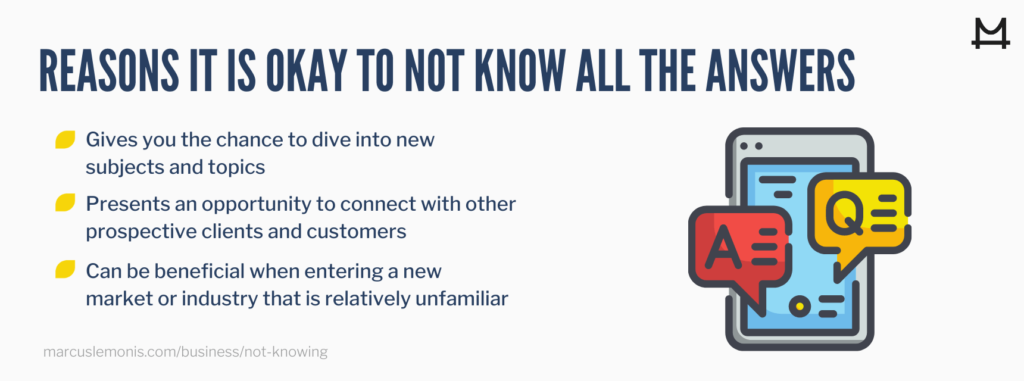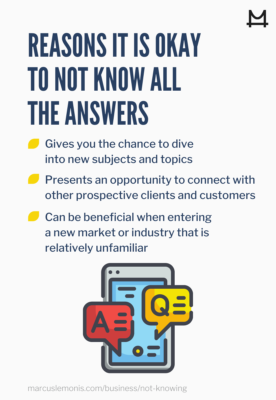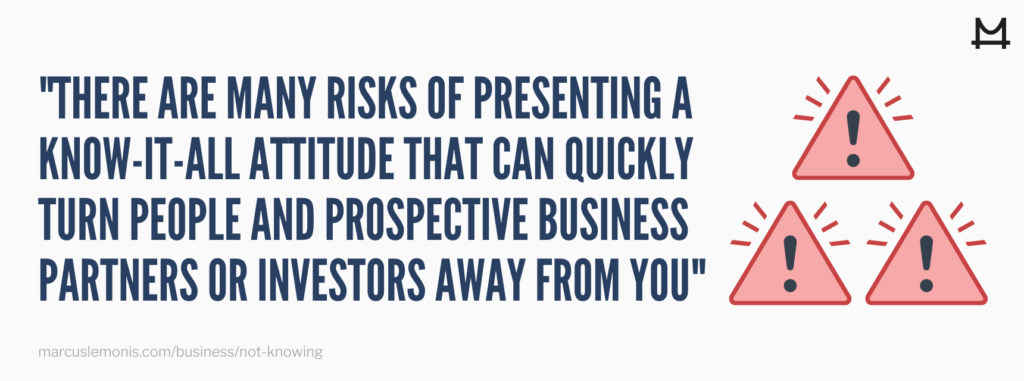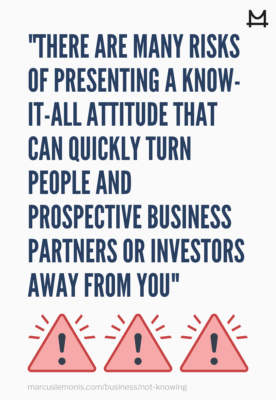Admitting that you are unsure of something, especially in business, can feel extremely daunting and stressful, especially if you are working to build a name for yourself or a professional reputation in a specific market or niche. While it is important to have a complete understanding of the basics of business and how your brand operates, it’s okay to not know everything at all times. Understanding what to do when you are unsure of something in a tricky social or business situation can help you to quickly recover with ease without lying or deflecting. If you are able to admit when you don’t know something and remain vulnerable and open to new ideas and information, you will gain more through the learning process.
Is It Okay to Not Have All the Answers?
Yes, it is always okay not to have all of the answers. There is not one person on planet Earth with all of the answers, and any individual claiming otherwise may be thinking too highly of themselves. One of the most inspiring aspects of the human condition is the ability to learn, grow, and change despite failures, shortcomings, and misunderstandings. Without admitting our faults and struggles, true growth becomes nearly impossible.
When you are surrounded by the right influences and professional mentors, investors, and business associates, admitting that you do not have all of the answers can actually open more doors to new opportunities, solutions, and ideas. As Marcus has said, “My number one asset is vulnerability. If you can be more vulnerable and more human, I’m telling you that you will do more business.”

An example of a company whose owners didn’t have all of the answers, but were able to listen, learn and adapt is a custom drum company run by two brothers. The company was originally founded in 2000 in their grandmother’s basement. As the business began to expand and suddenly explode in the mid-2000s after landing an alternative rock band as a client, things began to become a bit overwhelming. Although the company was expanding rapidly, it was becoming increasingly difficult for the brothers to manage the inventory, margins, and clients on their own.
After reaching out to Marcus and admitting that they were in over their heads, Marcus was able to help get them back on track. Marcus showed them how to improve the 3P’s of their business – People, Process and Products. They streamlined their operations, landed a few new contracts, and are a thriving business today.


Why It's Okay to Not Know Everything in Business
Even if you have been working in business for years or decades, you can’t be expected to know everything. The benefit of this is it gives you the chance to dive into new subjects and topics that you are interested in and those that are most relevant or important to your own business, brand, and future plans. Additionally, not knowing everything in business also presents an opportunity to connect with other prospective clients and customers, especially if you are entering a new market or industry that is relatively unfamiliar.
Risks of a "Know-It-All" Attitude
While you may personally feel confident and sure of yourself and your business knowledge, there are many risks of presenting a know-it-all attitude that can quickly turn people and prospective business partners or investors away from you.

Such was the case when Marcus met with a self-made entrepreneur and owner of a customizable t-shirt printing shop. The business generated more than $2 million in unexpected sales, providing the owner with an excellent opportunity to reinvest into his own empire. Unfortunately, the owner instead created multiple businesses within the tshirt shop, ranging from a restaurant and sign company to a sports complex complete with a rock-climbing wall, ultimately spreading the company too thin financially.
When Marcus arrived to help, the owner was originally onboard with the ideas Marcus shared, and seemed willing to participate in them himself.
Sadly, even after finally admitting to not knowing how to effectively sell, market, or manage the conglomerate he had created, the owner eventually dismissed the advice and guidance from Marcus altogether and their deal fell through.
Being open, honest, and willing to listen and learn is essential in business, especially when you are seeking help from investors or mentors who are willing to assist you in the process.


How to Handle Situations in Business When You Don't Know
Always plan business meetings and potential questions as well as answers ahead of time. Ensure that you are prepared to confidently cover the subject matter likely to be broached and discussed during an upcoming meeting, conference, or video chat. The more prepared and confident you appear in what you are saying, the less likely you are to feel nervous or anxious if you do come across something you don’t know during the conversation.

If you are unsure of specific information such as numbers, data, or statistics, simply admit that you do not know the details off-hand and that you are happy to locate and provide them to your customer or associate as soon as possible. Avoid guessing when it comes to numerical and empirical data, as this can lead others to view you as informal and unprofessional. When you feel comfortable with the individuals you are surrounded by, it is much easier to admit what you do not know without fear of judgment.
Tips for Handling Business Problems When You're Unsure How
Business issues can be complex, nuanced, and extremely complicated, especially if your business deals with clients, investors, or business associates on a daily basis. Knowing how to effectively and efficiently handle business problems even when you are unsure of how to begin is essential to be viewed as a professional leader in any industry.
- I think there are a lot of angles that can be covered here, and I have to really think this over to give a proper response.
- I'd have to think about it and get back to you, as the question/comment you are asking/sharing is nuanced and complex.
- I'm not an expert on this matter and would refer to X professional for a more accurate and thorough answer.
- I am not sure of the specifics, I can get and provide that data for you.
- I do not know the exact numbers and would not want to offer up false information.
- I have to get back to you on that.
Although it is not always easy to admit when you do not know something, especially as it pertains to your own business or brand, it is important to know that it is okay as long as you’ve done your research and are as prepared as possible. Understanding that everyone in business, regardless of how successful and prominent they appear, are just as human as you, can help you the next time you enter into an important business meeting or negotiation.
- How do you currently handle problems in business that you don't have a solution for?
- After reading this article, are there any areas you can improve on?
Source
Theriault, M. (2014, September 18). You can’t know everything: how admitting this gives you credibility. Retrieved from
https://www.forbes.com/sites/allbusiness/2014/09/18/you-cant-know-everything-how-admitting-this-gives-you-credibility/#4c60e0db3c62





